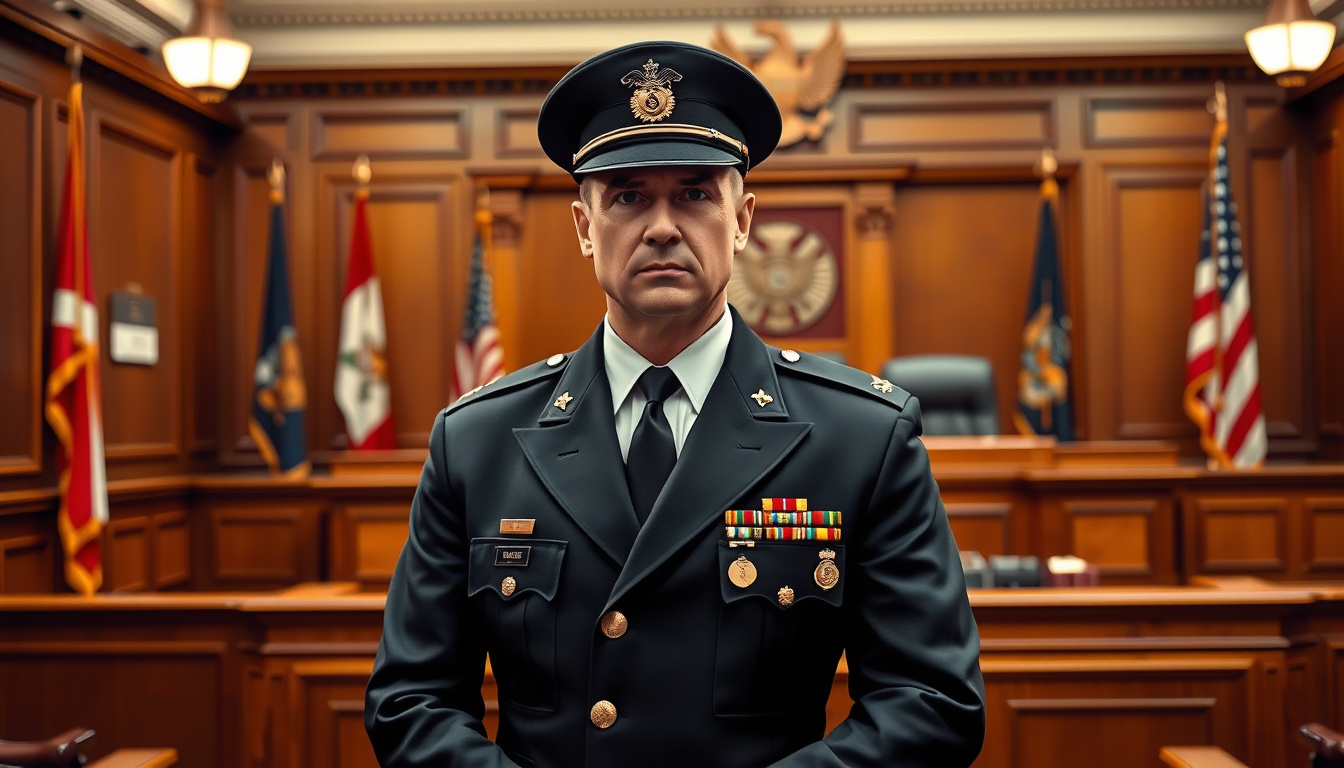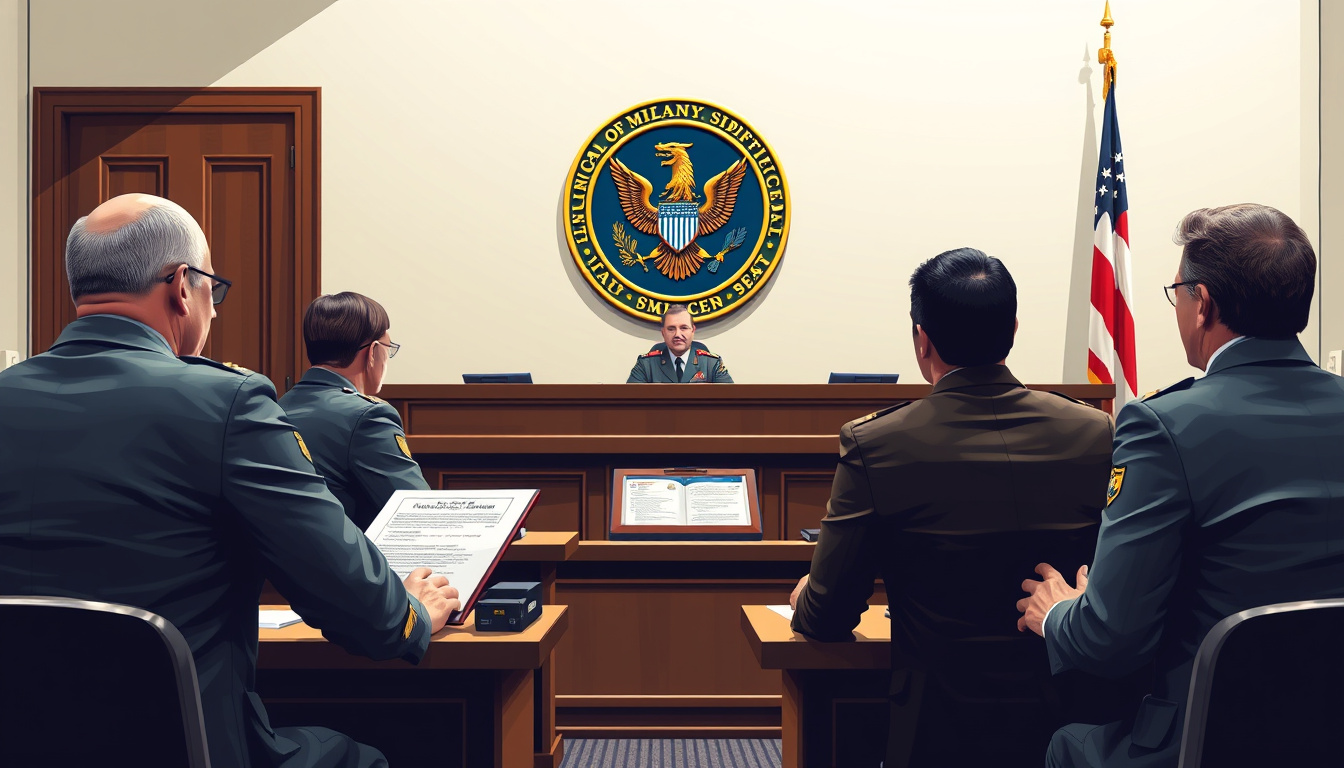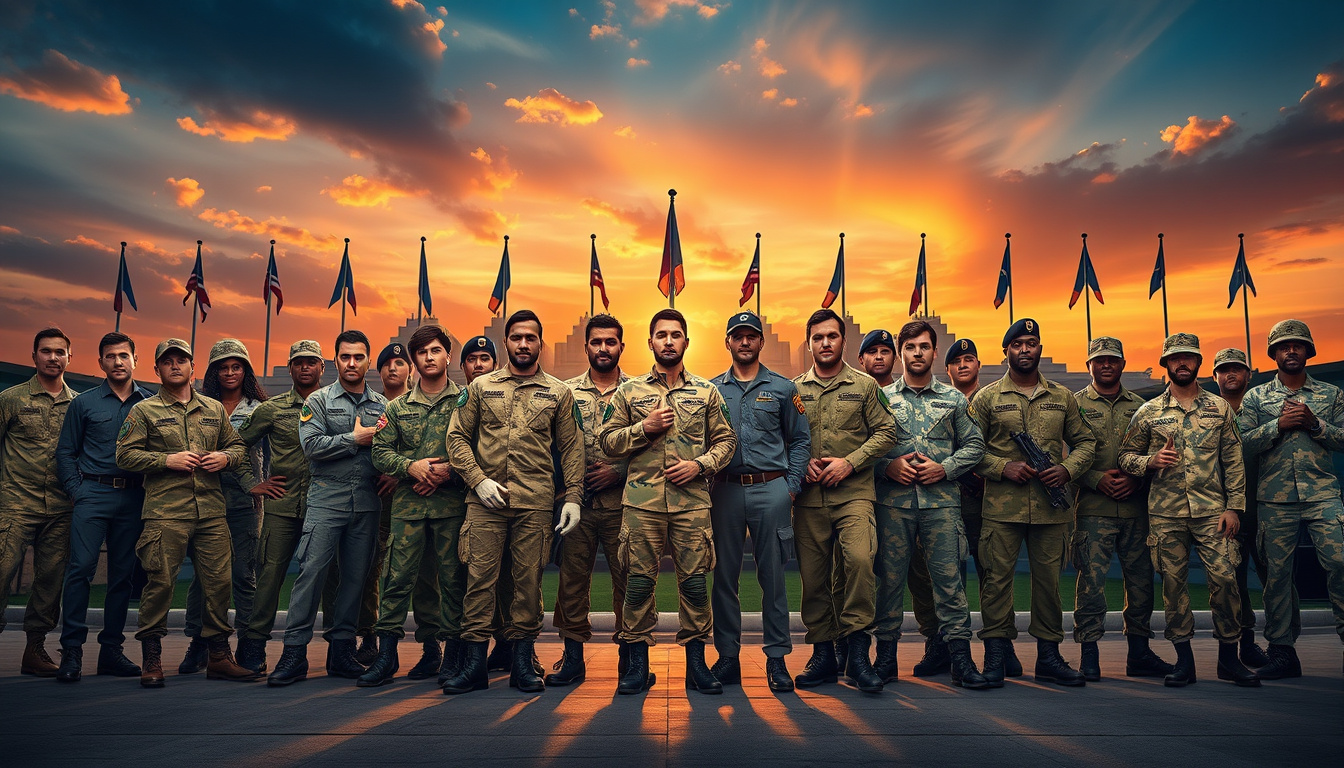When military servicemembers and their families face serious legal challenges, the need for skilled representation becomes paramount.
Whether dealing with court-martial proceedings, UCMJ violations, or administrative discipline, having an experienced military defense attorney can make a significant difference in the outcome of a case.
This article will delve into the vital role of military defense attorneys, the types of cases they handle, their unique differences from civilian attorneys, the legal rights of service members, and some tips on choosing the right attorney for your situation.
Understanding these elements can empower servicemembers and their families to navigate the complexities of military law with confidence.

Key Takeaways
- Military defense attorneys specialize in representing service members in legal matters within the military justice system.
- They handle various cases including court-martials, non-judicial punishments, and administrative separation boards.
- Unlike civilian defense attorneys, military defense attorneys must understand unique military laws and regulations.
- Service members have specific legal rights that a military defense attorney can help protect during legal proceedings.
- Choosing the right military defense attorney is crucial for receiving effective representation and safeguarding one’s rights.
Introduction to Military Defense Attorneys
When facing serious allegations or disciplinary actions within the military, it’s crucial for servicemembers and their families to understand the importance of having a knowledgeable advocate by their side.
This is where a military defense attorney comes into play.
These specialized legal professionals are dedicated to defending the rights of servicemembers who are facing court martial, administrative actions, or allegations under the Uniform Code of Military Justice (UCMJ).
Their expertise not only ensures a robust defense but also provides much-needed support to families navigating the complexities of military justice.
In this article, we will explore the integral role of military defense attorneys, the types of cases they manage, and the significance of having them on your side during these challenging times.
Role and Responsibilities of a Military Defense Attorney
When facing the complexities of military justice, understanding the role and responsibilities of a military defense attorney becomes crucial.
A military defense attorney is not just a legal representative; they serve as a vital advocate for servicemembers and their families navigating the intricacies of the Uniform Code of Military Justice (UCMJ).
Their primary responsibility is to provide competent legal counsel to those facing court martial, criminal allegations, or disciplinary actions within the military system.
This includes vigorously defending the accused by scrutinizing evidence, interviewing witnesses, and developing legal strategies that can mitigate potential penalties.
Additionally, a military defense attorney guides clients through each stage of the legal process, ensuring that their rights are upheld and that they understand the implications of their situation.
Beyond representation in court, these attorneys also provide crucial support, helping clients make informed decisions about plea bargains, administrative separations, or appeals.
They play a key role in maintaining the integrity and morale of military personnel by ensuring that justice is fairly administered, which directly impacts the life and career of a servicemember.
Ultimately, having a skilled military defense attorney on your side can be the difference between a favorable outcome and a life-altering conviction.
‘Injustice anywhere is a threat to justice everywhere.’ – Martin Luther King Jr.

Types of Cases Handled by Military Defense Attorneys
When facing legal issues within the military justice system, it’s crucial to understand the various types of cases that a military defense attorney can handle.
Military servicemembers and their families can find themselves embroiled in complex legal matters, and having a knowledgeable military defense attorney by your side can make a significant difference in the outcome of your case.
Here’s an overview of the types of cases commonly addressed by military defense attorneys:
1.
Court Martial Proceedings: One of the most serious legal challenges in the military is a court martial.
These proceedings can arise from allegations of serious offenses, such as assault, theft, drug offenses, or even more severe crimes like murder.
A military defense attorney specializes in navigating the rigorous military justice system to defend servicemembers facing these grave charges.
They can provide essential legal representation during pre-trial, trial, and post-trial processes, including appeals.
2.
UCMJ Violations: The Uniform Code of Military Justice (UCMJ) sets forth laws and regulations that govern the conduct of military personnel.
Violations can lead to serious consequences, including legal action, administrative discipline, or even separation from the service.
A military defense attorney can help servicemembers understand specific UCMJ violations they might be facing, explain their rights, and prepare a defense to fight the charges against them.
3.
Administrative Discipline: Not all legal issues in the military require a court martial.
Sometimes, servicemembers face administrative actions for various reasons, such as failure to maintain standards, misconduct, or performance issues.
An administrative separation can affect a servicemember’s career and benefits.
A military defense attorney can assist in challenging such actions, helping to present a strong case and protecting the servicemember’s interests during administrative hearings.
4.
Drug Offenses: Drug-related offenses are particularly serious in the military and can result in both civilian and military penalties.
Charges could range from possession to distribution of illegal substances.
A military defense attorney well-versed in military drug policy can provide invaluable support, advocating for a fair evaluation of the circumstances surrounding the case and representing the servicemember in court.
5.
Sexual Assault Allegations: Allegations of sexual assault carry severe ramifications and can lead not only to court martial but also to significant social and career damage.
A skilled military defense attorney can offer critical insights into the legal process surrounding such accusations, working tirelessly to ensure a fair trial and to protect the rights of the accused.
6.
Administrative Separations (ADSEP): Sometimes, servicemembers face administrative separation due to misconduct or failure to meet mental or physical health standards.
An experienced military defense attorney can navigate the complex regulations surrounding ADSEP proceedings to help preserve the servicemember’s record and career.
7.
Appeals and Post-Trial Relief: Even after conviction in a court martial, servicemembers have the right to appeal the outcome.
Military defense attorneys specialize in post-conviction relief efforts, guiding clients through the intricacies of filing appeals, presenting new evidence, and ensuring their rights are upheld even after trial.
8.
Discharge Upgrades: A less-discussed but critical area of military law involves seeking upgrades to military discharges.
A military defense attorney can assist veterans who believe their discharge status—such as a General or Other Than Honorable discharge—was unjust, helping them file applications for upgrades that may affect their benefits and future opportunities.
In conclusion, understanding the types of cases handled by military defense attorneys is vital for servicemembers and their families navigating potential legal challenges.
The intricacies of military law require specialized knowledge and experience, making the choice of a qualified military defense attorney critical in securing a fair outcome.
Differences Between Military and Civilian Defense Attorneys
When facing court martial or any disciplinary action under the Uniform Code of Military Justice (UCMJ), it’s crucial to understand the key differences between military and civilian defense attorneys.
A military defense attorney is specifically trained to navigate the unique legal landscape of the military justice system, which operates under different rules and procedures compared to civilian courts.
These attorneys often have firsthand experience as service members, giving them insight into military culture and the nuances of military law that civilian attorneys may lack.
For instance, military defense attorneys are familiar with the regulations governing administrative separations and the consequences of a court martial, which can include serious penalties such as confinement or dishonorable discharge.
In contrast, civilian defense attorneys primarily focus on criminal law in civilian jurisdictions and may not possess an in-depth understanding of military regulations or the implications of a UCMJ charge.
Therefore, it’s essential for service members and their families to engage a knowledgeable military defense attorney who can effectively guide them through the intricacies of their case and advocate for their rights within the military system.

The Legal Rights of Service Members
When military servicemembers face court martial, UCMJ violations, or allegations that threaten their careers and reputations, understanding their legal rights is crucial.
One of the most important steps for service members is securing a qualified military defense attorney.
A military defense attorney specializes in handling cases related to military law, including administrative discipline and potential administrative separation.
Their expertise is invaluable in navigating the complexities of military justice, ensuring that the rights of service members are upheld throughout the process.
Service members have the right to legal representation from the moment an investigation is initiated, and it is essential to have a defense attorney who understands military regulations and procedures.
Moreover, they are entitled to due process, meaning that they should receive fair treatment during investigations and hearings.
This right extends to being informed of the charges being brought against them, the opportunity to present a defense, and the right to appeal decisions made against them.
With the support of a military defense attorney, servicemembers can mount a robust defense or negotiate for the best possible outcome in administrative proceedings.
How to Choose the Right Military Defense Attorney
Choosing the right military defense attorney is a critical step for servicemembers and their families facing serious challenges such as court martial, potential violations of the UCMJ (Uniform Code of Military Justice), or administrative actions.
With the stakes so high, it’s essential to ensure you have a skilled advocate who understands the intricacies of military law.
Begin by researching attorneys who specialize specifically in military defense, as they will possess the unique knowledge and experience required to navigate the complexities of military justice.
Look for an attorney with a strong track record in cases similar to yours, and inquire about their familiarity with military regulations and procedures.
Additionally, consider their communication style and availability—an attorney who can provide clear, timely updates will help alleviate the stress often associated with such cases.
Recommendations from fellow servicemembers or families who have faced similar situations can also guide you towards finding a qualified military defense attorney.
Ultimately, trust your instincts; the right attorney will make you feel more informed and empowered as you navigate your legal situation.

Conclusion: The Importance of Military Defense Representation
In conclusion, the importance of having an experienced military defense attorney cannot be overstated for servicemembers and their families facing court martial, UCMJ charges, or any form of administrative discipline or separation.
The military legal landscape is uniquely complex, governed by its own set of rules and regulations that can significantly impact a servicemember’s career, reputation, and personal life.
An adept military defense attorney understands the intricacies of military law and the specific processes involved in both criminal allegations and administrative actions.
They can offer invaluable support, ensuring that you understand your rights and options while crafting a robust defense tailored to your situation.
Moreover, a skilled attorney advocates passionately on your behalf, leveraging their expertise to navigate court martial proceedings, negotiate plea deals, or challenge adverse administrative actions.
By retaining a knowledgeable military defense attorney, servicemembers can better safeguard their futures and seek a favorable outcome, allowing them to focus on what truly matters—serving their country and supporting their loved ones.
Frequently Asked Questions
What is the primary role of a military defense attorney?
The primary role of a military defense attorney is to provide legal representation to service members facing charges or disciplinary actions within the military justice system.
They ensure that the rights of the accused are upheld and work to achieve the best possible outcome in each case.
What types of cases do military defense attorneys typically handle?
Military defense attorneys typically handle a variety of cases, including Uniform Code of Military Justice (UCMJ) violations, court-martials, non-judicial punishment (NJP), administrative discharge proceedings, and issues related to service member rights and entitlements.
How do military defense attorneys differ from civilian defense attorneys?
Military defense attorneys operate under the Uniform Code of Military Justice and are knowledgeable about military law and procedures, which are significantly different from civilian law.
They are also trained to navigate the unique environment of military courts and regulations.
What legal rights do service members have during military proceedings?
Service members have various legal rights during military proceedings, including the right to an attorney, the right to remain silent, the right to a fair trial, and protection against double jeopardy.
These rights ensure due process within the military justice system.
What should I consider when choosing a military defense attorney?
When choosing a military defense attorney, consider their experience with military law, their familiarity with the specific charges you face, their communication style, and their reputation within the military community.
It is important to find an attorney who can effectively advocate for your rights and interests.
If you or a loved one is under investigation or facing charges under the UCMJ, don’t wait to protect your future. Contact Gonzalez & Waddington, Attorneys at Law. Our battle-tested military defense lawyers have successfully defended service members worldwide against the most serious military offenses. Call us today for a confidential consultation and put our elite military defense attorneys in your corner.


